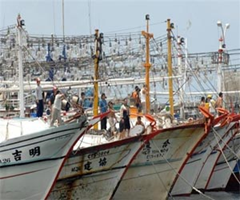Fishermen left high and dry fear for Mekong River’s future
By Staff Writers
Vientiane (AFP) April 4, 2010 Fisherman Phimmalang Sengphet paddles his boat to the sandy banks of the Mekong River in Laos and inspects his meagre haul. “We can’t even catch enough to feed ourselves,” he says wearily. The 38-year-old was able to net more than 10 kilos (22 pounds) of fish a day this time last year, but now he is lucky to bring home just half that. He blames the unusually low water levels — the most extreme he has ever seen. “We want to know why. This is our life, catching fish to sell at the market. This is our business to provide for our families,” he says as he wanders back to his village on the outskirts of the capital Vientiane. Mekong River levels in parts of Laos have hit their lowest in 50 years. The situation has alarmed the millions who depend on what is the world’s largest inland fishery with an estimated annual catch of about 3.9 million tonnes, according to the Mekong River Commission (MRC). “In Laos we don’t have the sea, we only have the Mekong for water and for food, so it’s very important to us,” said another villager, 63-year-old Som Sirivath, as she waded waist-deep into the river in search of some supper. The ebbing flows are not confined to land-locked Laos, one of Asia’s poorest nations. In the upper Mekong basin in China’s southwest, more than 24 million people are short of drinking water as a result of the worst drought in a century. Downstream, the north of Thailand has also suffered five-decade river lows. “Many people I know have changed to agricultural work because they can’t live on income from the fishing industry,” said Niwat Roykaew, head of a local conservation group in the northern Thai province of Chiang Rai. The cause of the dwindling waterway is a matter of fierce debate, with activists pointing the finger upstream to China’s hydropower dams, which they believe channel water away from the upper reaches of the Mekong. Pianporn Deetes, of campaign group International Rivers, said water levels were not just dropping but “fluctuating unnaturally”, and that disruption to the ecosystem began after China built its first dam more than a decade ago. “Local people experienced the loss of fish catch, the destruction of aquatic resources,” the Thai environmentalist told a recent forum in Bangkok. …
